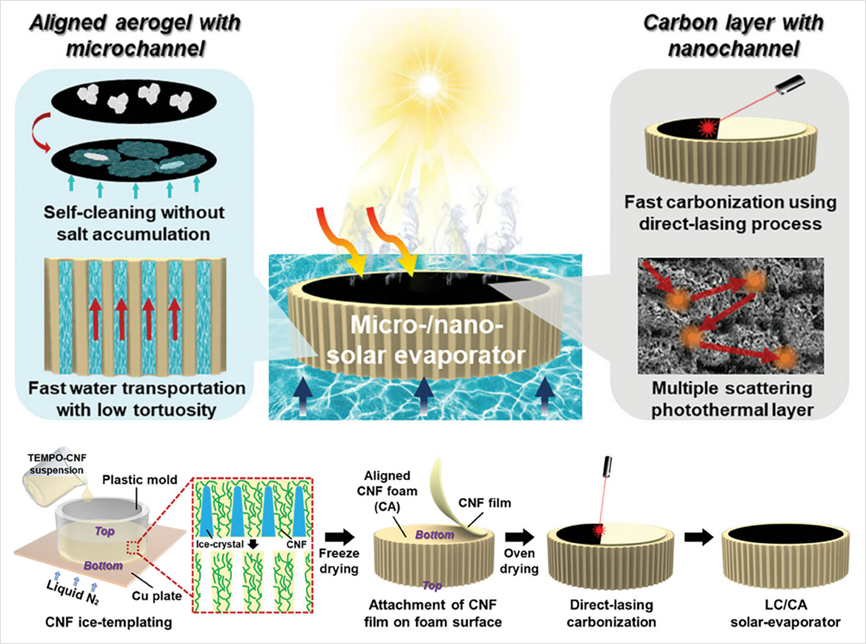header
News
Professor Jungmok You’s Research Team Pioneers Eco-friendly Technology to Solving Global Water Shortages
- WRITER 학무부총장실

Currently, nearly two billion people around the world are facing chronic water shortages, a crisis exacerbated by climate change, environmental pollution, and population growth. As the situation worsens, the development of sustainable technologies for efficient water distillation and purification has become increasingly more important
Professor You’s research team at the Department of Convergent Biotechnology and Advanced Materials Science has presented a new technological approach to solving the water shortage problem by producing a solar thermal evaporator based on cellulose nanofibers (CNF). This evaporator combines the CO2 laser carbonization process and ice-templating techniques to achieve both efficient water evaporation and eco-friendly water treatment. As a result, it presents a promising alternative to conventional high-cost desalination technologies.
The research team designed a solar thermal evaporator using cellulose as its primary material. Cellulose, a material that can be obtained naturally from trees and plants, is biodegradable and has a minimal environmental impact. The team processed the cellulose into cellulose nanofibers (CNF) to create a fiber structure capable of quickly transferring water. They then transformed it into cellulose aerogel (CA) to optimize evaporation performance.
The research team applied two innovative processes to improve the performance of the solar evaporator. First, they used the ice-templating technique to create a porous structure, which facilitated water flow and enabled rapid water transfer. Second, they formed a carbon layer on the surface of the evaporator through the CO2 laser carbonization process. This carbon layer efficiently absorbed sunlight and converted it into heat, significantly improving water evaporation efficiency.
The fabricated solar evaporator demonstrated excellent performance, achieving an evaporation rate of 1.9 kg m⁻² h⁻¹ and an evaporation efficiency of 83.8% with pure water. It also operated stably in a simulated seawater environment with the specially designed surface to improve buoyancy and reduce heat loss, ensuring stable performance under various conditions.
The technology developed by Professor You’s research team has broad practical applications in such areas as seawater desalination, agricultural water purification, and industrial wastewater treatment, particularly in water-scarce areas. Notably, its minimal environmental impact is significant in that the new technology addresses environmental pollution associated with conventional desalination methods by utilizing eco-friendly materials like cellulose, while offering economical and sustainable water treatment solutions. Building on this success, the team plans to drive the commercialization of eco-friendly and cost-effective water treatment technologies and continue advancing sustainable solutions for water shortage problems. Through these efforts, the team aims to develop technologies that can generate positive impacts on both the environment and society.
The research results were published online in the world-renowned academic journal Advanced Functional Materials on November 17, 2024, under the title, “Nanocellulose-Based Interfacial Solar Evaporator: Integrating Sustainable Materials and Micro-/Nano-Architectures for Solar Desalination.”